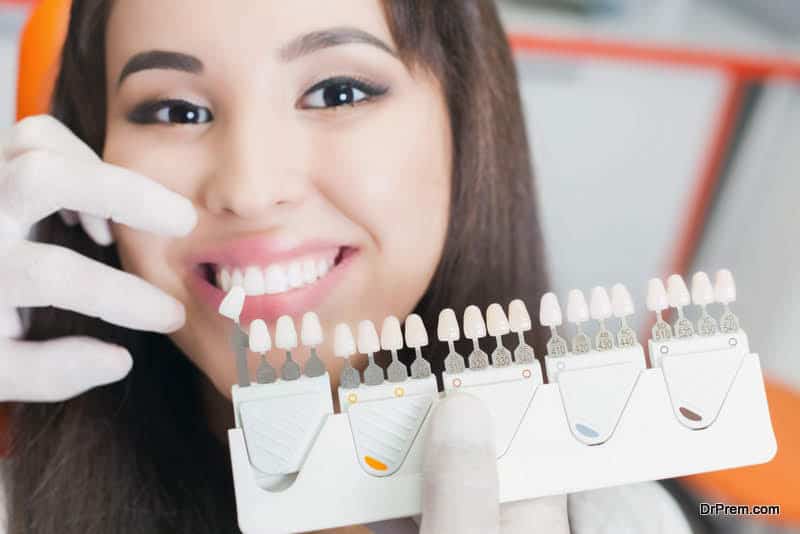Definition:
Dental veneers are often used to correct the cosmetic defects of the teeth. These are customized, thin tooth coverings made up of porcelain or ceramic that fit over existing teeth and are resistant to stains and chipping, within reason. Veneers provide a beautiful smile.
Candidates:
People that have:
- Spaces between teeth
- Broken Teeth
- Chipped teeth
- Stained fillings
- Stained teeth
- Crooked or uneven teeth
Details of Procedure:
- A thin laminate is fabricated and cemented on the facial aspect of the tooth to mask the discoloration or any other abnormality on the tooth.
- Dental veneers are not permanent and needs to replace every 5 to 10 years. They can last longer with good dental care
Facts and Figures:
- Veneers were invented by a dentist named Charles Pincus. Initially, they were held on by denture adhesive, and were used to fell off in a very short time; still they were useful to change the appearance of an actor’s teeth temporarily.
- Simonsen and Calamia introduced the use of porcelain with hydrofluoric acid in 1982.
- AACD data shows that in 2006 an estimated 599,000 procedures of dental veneers were performed.
- Porcelain Veneers is mostly preferred by the patient of age 20-25.
Advantages and Disadvantages:
Advantages
- Veneer provides a natural tooth appearance
- Gum tissue accepts the porcelain easily
- The colour of dark teeth can be made to appear white with porcelain
- They give strength and improve aesthetic look of teeth
- Placing veneers on teeth is generally a painless procedure
- The Dental veneers are placed in an outpatient procedure and require approx 3 dental clinic visits.
Disadvantages:
- Irreversible placement
- Veneers does not serve a purpose if the teeth are unhealthy, weakened or tooth had an inadequate amount of existing enamel.
- Very rare but there is a chance of dislodge or the veneer falling off
- Result may be cosmetically unappealing
- Change of speech
Risks and Complications:
- Veneer breakage or damage
- Tooth sensitivity or damage
- Medicinal reaction
- Prolong numbness and pain
- Damage to tooth structure
Pre and Post-operative care:
Pre-operative preparation:
- Visit to dentist and have knowledge of procedure, post procedure management.
- Inform doctor about any allergy and a habit of smoking. Quit smoking.
- X-rays of the tooth to have an impression of it
- Know the medicine to be taken or stopped before procedure
- Ask friend or relative to accompany and for the help after procedure
- Medical tourist are advised to choose a hotel near the dental clinic so that they can utilize their time in between visits to dentist for relaxing and enjoying the vacation
Post-operative care:
- Patient may have strange feeling post to veneers but that is expected to subside within a couple of weeks.
- It is important to take all medication prescribed by a dentist and follow the instruction properly.
Do’s, Don’ts and Precautions:
- Do brush and floss regularly
- Don’t munch frequently on snacks
- Don’t use abrasive tooth paste
- Don’t bite on hard objects like pens, nails etc
- Don’t forget to wear mouth protector while participating in contact sports
- Avoid eating food that leaves stains






